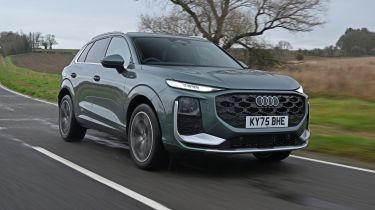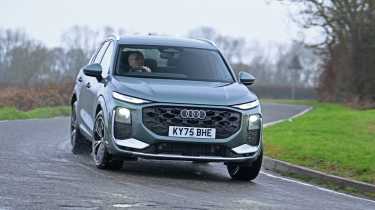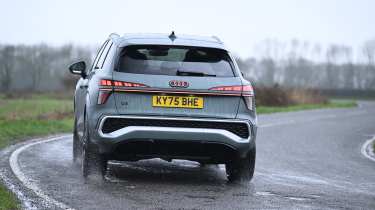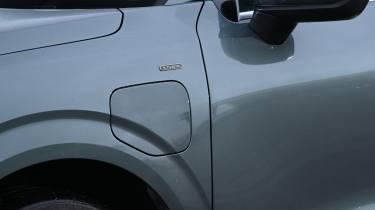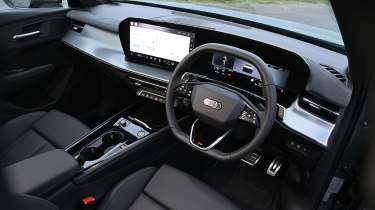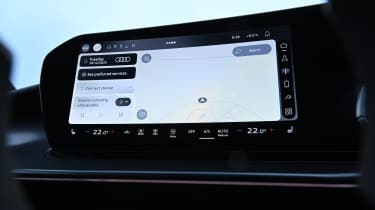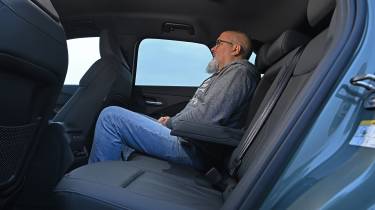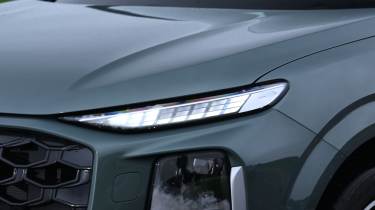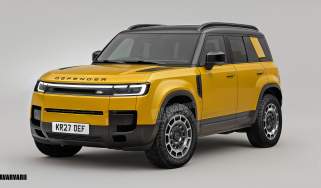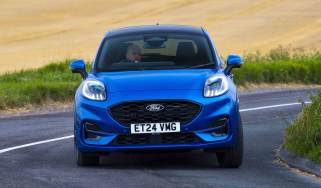Audi Q3 review
The latest Q3 is evolutionary rather than revolutionary, but it’s an upmarket compact SUV that’s good to drive

Our opinion on the Audi Q3
For the third-generation Audi Q3, the German firm has evolved its compact SUV with looks inspired by the larger Q5 and plenty of tech that’s shared with the larger machine. As a result, it has a feature-packed infotainment system, it’s fine to drive, although the ride is better at higher speeds than around town, and the plug-in hybrid version offers a decent all-electric range.
The quattro models offer plenty of performance while we await the return of the RS Q3, while Audi’s familiar upmarket qualities are just about intact, with just a few pieces of hard plastic in places letting the feeling of quality down.
The Audi Q3 isn’t a game changer, but it offers all of the qualities that buyers in the compact SUV sector will expect from a car with an Audi badge on the nose. It can get expensive at the top of the range, though.
About the Audi Q3
The Audi Q3 has been a big seller for the German firm since it first arrived in 2012, and is now in its third generation. It’s grown over time to help it deliver more space and practicality in a compact SUV body, and as with the previous model, there are five-door and sportier- looking Q3 Sportback bodystyles to choose from.
Used - available now
The range comprises Sport, S Line and Edition 1 variants, with the latter being offered as a high-spec launch model. Engine options vary according to trim level, with the Sport coming with a 1.5 TFSI petrol and a 2.0 TDI diesel with front-wheel drive, and a 2.0 TFSI petrol with quattro four-wheel drive. For the other two trims these three options are joined by a more powerful 2.0 TFSI quattro, which is the most powerful model ahead of the launch of the next RS Q3.
As well as these petrol and diesel options, the Q3 also comes with a plug-in hybrid drive system. This is called e-hybrid, and comprises the 1.5 TFSI petrol and a battery-electric system that offers zero-emissions driving. This comes in all three trim grades.
Audi Q3 prices and latest deals
Prices for the Audi Q3 start at around £39,000, which isn’t cheap, but is on a par with similar premium rivals. However, higher-specification powertrains and equipment grades can see prices edge higher, with some versions breaking the £50,000 barrier.
You can configure your dream Audi Q3 with our Buy a Car service. Alternatively you can buy a new Audi Q3 from stock, or find out the very best Audi Q3 leasing deals.
Performance & driving experience
Pros |
|
Cons |
|
The VW Group has put some serious resources into upgrading the Audi Q3’s platform to give customers a wide choice of competent powertrains and chassis options.
Engines kick off with a 1.5-litre TFSI four-cylinder petrol. Peak power is rated at 148bhp, with 250Nm of torque. This base car, as with every Q3 in the line-up, features a dual-clutch automatic transmission, while front-wheel drive is the only configuration.
A 2.0-litre TFSI four-cylinder petrol engine is next up in two power outputs. The 201bhp/320Nm version is expected to be the biggest seller in the UK, while a more potent model with 262bhp/400Nm – the same power output (but more torque) than a Volkswagen Golf GTI – is also offered. Both versions feature quattro four-wheel drive.
A 148bhp diesel is also offered, but unlike the petrol with the same output, the diesel is a 2.0 TDI for the extra torque (360Nm) that a larger-capacity engine offers. However, high-mileage drivers looking for ultimate efficiency could be tempted by the latest Q3 e-hybrid. This latest-generation plug-in hybrid option uses the 1.5 TFSI petrol accompanied by an electric motor and battery pack for a combined power output of 268bhp/400Nm, making it the most powerful model in the line-up at launch.
| Model | Power | 0-62mph | Top speed |
| Q3 1.5 TFSI 150 | 148bhp | 9.1 seconds | 140mph |
| Q3 2.0 TFSI 204 quattro | 201bhp | 7.1 seconds | 142mph |
| Q3 2.0 TFSI 265 quattro | 262bhp | 5.7 seconds | 149mph |
| Q3 1.5 e-hybrid | 268bhp | 6.8 seconds | 134mph |
Performance, 0-60mph acceleration and top speed
All of the combustion-engined models have decent torque from low revs, so you don’t have to push them too hard to make progress, and they have good mid-range performance for everyday use.
The 1.5 TFSI is a familiar Volkswagen Group unit. It’s exceptionally refined, but can struggle to power larger models such as the Q3. It has lots of low-down torque, so it doesn’t feel too tardy at low speeds, but can feel underpowered when pushed – the entry-level BMW X1 does a better job in terms of overall performance.
The 262bhp variant offers a huge uplift in performance, while quattro four-wheel drive makes full use of the extra power, especially in slippery conditions. It also seems to drive with more fluidity than the 148bhp 1.5-litre variant, which can sometimes slur gearshifts.
While the e-hybrid is the most powerful Q3, it also has a kerbweight that’s 150kg greater than the 2.0 TFSI 265’s, so it’s more than a second slower from 0-62mph. It still feels quick enough, but it’s not as smooth as the pure-petrol model, because the transmission shunts as it switches between the electric motor and combustion engine – it’s a lot smoother than past versions, though. The petrol engine does tend to sound thrashy when pushed, so you soon get into the habit of accelerating just enough to use the electric motor’s power without the engine firing up.
Town driving, visibility and parking
Regardless of power output, all pure-petrol variants drive well for the class, with accurate steering and good response from the accelerator and brake pedals.
A high driving position gives a good view out, while light yet accurate steering at lower speeds boosts manoeuvrability. All models come with 360-degree parking sensors and a reversing camera, too. There’s a bit of a fidget to the ride at lower speeds, but it’s not intolerable, and the trade off is decent agility.
The e-hybrid works best when there’s some charge in the battery. When it’s full, the system prioritises electric running at lower speeds, and the system delivers smooth and responsive performance. It’s not quite as refined when the engine is employed, with more noise from under the bonnet, but the power delivery remains smooth when using smaller throttle inputs.
Country road driving and handling
A common trait of Audi models is that their ride improves as you increase your pace, and on country roads the Q3 feels a lot more stable and responsive than it does at lower speeds. The suspension soaks up bumps well and there’s good grip, while body roll is kept reasonably well in check.
The e-hybrid is a little bit more compromised than other variants due to the extra weight of the car’s plug-in system. This version is around 150kg heavier than the 2.0 TFSI quattro model, so there’s a bit more body roll in corners, but on the other hand the heavy battery helps to smooth out the car’s ride, so it plays to the Q3’s strengths in terms of refinement.
As with any PHEV, the e-hybrid is at its best when there’s some charge in the battery, so the electric motor smooths out the powertrain’s responses. When the battery is flat, there’s more shunt from the transmission as the electric motor and engine work in tandem to make progress. However, the Q3 e-hybrid is still one of the smoother plug-in powertrains that’s currently available.
The Q3’s adaptive suspension system is worth mentioning, because it does an excellent job of widening the bandwidth between a comfortable ride and sporty-feeling driving experience. These new dampers come with a clever dual-valve design that features excellent bump absorption when in comfort mode – even on the top-spec 20-inch wheels and tyres of the cars we tested. A caveat to this is that the adaptive suspension is only available on top-spec Edition 1 trim.
Motorway driving and long-distance comfort
The Q3 is an accomplished long-distance cruiser, especially in e-hybrid guise where the weight of the battery continues to help settle the car’s ride. Again, with charge in the battery the electronics will favour electric drive even at motorway speeds, so refinement remains positive. However, unlike some plug-in models, the Q3 defaults to the petrol engine once the battery has been run down, so there’s more engine noise to be heard – you’re left with a heavier Q3 powered by a 1.5-litre turbocharged engine, so it needs working harder if you need extra power for overtaking.
"Audi’s new dual-valve dampers have significantly increased the suspension’s ability to offer a comfortable ride on one hand and tight, composed body control on the other. I wouldn’t say any Q3 is especially engaging to drive, but it always feels impressively composed and well rounded – not something you can say about most of its rivals." - Jordan Katsianis, senior staff writer.
MPG & running costs
Pros |
|
Cons |
|
We’ve driven three variants of Q3 with different powertrains and found that all get quite close to their official fuel economy figures, even when fitted with the biggest wheels available. We also found that the higher up the powertrain tree you go, the easier it is to match the official figures.
The entry-level 1.5 TFSI 148bhp Q3 is officially rated at 44.1mpg in top-spec Edition 1 trim and over the course of our test route, on a combination of country roads, motorway and a little bit of town and urban driving, we saw 42.1mpg.
Move up to the 2.0-litre four-cylinder petrol and the on-paper figures are a little startling, with the TFSI 201bhp rated at 34.4mpg and the TFSI 262bhp quattro managing only 32.1mpg. These figures are once again achieved in Edition 1 cars on the largest 20-inch wheels.
However, we drove the quattro model on the same roads as the 1.5 TFSI – and not slowly we might add – and matched the claimed figures with 32.1mpg. Diesel Q3s are rated at anywhere between 53mpg and 49mpg, depending on specification.
| Model | MPG | CO2 | Insurance group |
| Q3 1.5 TFSI 150 | 46.3mpg | 139g/km | 22 |
| Q3 2.0 TFSI 204 quattro | 36.2mpg | 177g/km | 29 |
| Q3 2.0 TFSI 265 quattro | 32.8mpg | 195g/km | 32 |
| Q3 1.5 e-hybrid | 156.9mpg | 40g/km | 30 |
Electric range, battery life and charge time
The e-hybrid is where things get more complicated, but the overarching message is that it’s very good for the class. On paper, the most efficient model offers 72 miles of pure electric range, and when we tested the Q3 e-hybrid in wintry conditions, the range predictor offered an estimate of 61 miles.
MPG figures range from 134-166mpg depending on specification, but this is inclusive of a full battery. In real-world testing, we saw an average of around 73mpg from a full battery and fuel tank, while the economy deteriorated to around 34/35mpg once the battery was flat.
There is an important caveat to the Audi’s efficiency figures, and that’s the fact they are rated on a new weighted MPG calculation. This explains why the Q3 PHEV’s fuel economy rating is around half that of a rival BMW X1 PHEV. These figures will equalise when the BMW undergoes a new model update, but for now it’s better to focus on the all-electric range, where the Audi leads the plug-in hybrid class.
Audi offers DC charging of up to 40kW, which is capable of topping up the battery from 10-80 per cent in 26 minutes at a public high-speed charger. AC charging is rated at 11kW, so a three-phase source can fully refresh the battery in two and a half hours, a standard home wallbox charger does the same job in three hours, or it’s 12 hours via a three-pin plug socket.
| Model | Battery size | Range | Insurance group |
| Q3 1.5 e-hybrid | 26kWh | 72 miles | 30 |
Insurance groups
As you might come to expect from an Audi, insurance groups are on the high side, but are no higher than they are for rival BMW and Mercedes models. The line-up starts in Group 22 for the entry level 1.5 TFSI Sport, rising to group 32 for the most powerful 2.0 TFSI quattro.
Tax
The highest-spec versions of the Audi Q3 break the £40,000 luxury car tax barrier, so it might be better to wait until April to buy, when the threshold increases to £50,000 and only the highest-spec versions will face the extra bill for years two to six.
Business users will automatically turn to the e-hybrid for the lowest company car costs. A percentage rate of six per cent is double that of an EV, but far lower than for the petrol and diesel variants, which start from 33 per cent, rising to the maximum 37 per cent at the top of the range. The diesel models are in the 34-35 per cent range.
Depreciation
Audi has always been an aspirational brand, and the Q3 has relatively strong residual values. It falls in the 50-55 per cent range, with the best performers being the TDI diesels, followed by the 1.5 TFSI and e-hybrid variants.
Interior, design & technology
Pros |
|
Cons |
|
The latest Q3 conforms to Audi’s recent design language, which rests on a complex aesthetic that the brand’s new design chief is about to stamp out completely. This isn’t important right now – the first Massimo Frascella car isn’t due out until 2027 – but when it does arrive, the Q3, along with most existing Audi models, will instantly look out of date.
The Q3’s chunky and complex design gives it the appearance of looking bigger than it actually is in the flesh, which we expect many customers will enjoy. The two-piece headlight units are fairly typical of 2025’s design themes, but they do feature big-car tech such as Digital LED beams that can augment the light to highlight your lane or hazards at night.
Of the two bodystyles, the sleeker Q3 Sportback is the more distinctive to look at, thanks to its sloping roofline. The rear ends of both Sportback and SUV models feature yet more class-first lighting technology.
As with the latest A6, the Q3’s rear lights are split into multiple elements, with the main upper lighting units joined by a thin light bar, with much larger and brighter brake light elements sitting below. It’s not a simple design, but it’s not unattractive. There’s a limited paint range, but with a bright red, deep blue, sage green and a couple of greys, customers are well catered for.
Interior and dashboard design
The cabin shares many of its design cues with larger models. The curved layout of the dual screens emulates the look of the latest Q5 and A6, but the displays situated within them are smaller. There’s no option for a passenger screen, as is available on those larger models, but big-car tech, such as a sophisticated head-up display, can be added as an option.
One new feature of the Q3 is its ‘double deck’ stalks. Rather than sprouting from the steering column, the indicator stalk and wiper selector are mounted on the left end of a bar that stretches behind the steering wheel, and they are more like rocker switches than traditional stalks. They take a bit of getting used to, especially the rotary controller for the wiper speed, which might be a bit fiddly if you’re driving with gloves on, but overall we found that they work well, and the actions that one uses often, such as a single-wipe or one-touch indicator, are intuitive to use. The other end of the column features the drive selector, which has a similar action and helps to free up space on the centre console for storage.
Materials and build quality
Overall the materials feel sturdy and contemporary. There’s a real-metal insert on the dash and plenty of soft-touch microfibre across the dash-top and door cards. However, in the various models we’ve driven there are a few odd material choices that don’t always seem to mesh together that well.
In place of traditional leather, Audi has wrapped the steering wheel of some models in an odd, rubbery textured vinyl that’s not particularly nice. The seats also feature strange textured woven fabrics on their outer trim elements, and all other materials are either black or grey.
We were also left unimpressed by the gloss-black sliding cover over the central storage bin. It doesn’t slide very smoothly when opening or closing, which is disappointing for something that you’re likely to be touching on a frequent basis.
Infotainment, sat-nav and stereo
Where the Q3 scores well is in its infotainment system. Audi revealed new software on its larger models, yet the system in the Q3 is actually completely bespoke and new to the brand.
Key stats include a 12.8-inch touchscreen display and 11.9-inch driver’s display mounted within a single curved housing. We like the layout, but the massive bezels make it look a little clunky and old-fashioned. The good bit, though, is the new digital interface that’s been designed for Audi’s smaller models, which now sits on an Android basis. This features a completely different user experience to the over-complex system found on the new A5 and A6.
The main screen, much like a modern Mercedes, features a full-size map with floating tiles that handle other functions such as phone, general information and media. Although the screen isn’t huge, these are laid out cleanly and are quick to access. Air-conditioning controls are integrated into the main screen in a static bar at the base – these work fine, but dedicated controls would be preferable.
The biggest improvement is the driver’s display that – unlike in a Q5 or A6 - can show a map view in front of the driver, keeping the screen free for passenger use. By default the screen narrows to show only a bar of information, with a rev-counter at its centre. We’d still prefer to have a more traditional dual-dial layout, but it’s a slicker, and far more readable layout than in other Audis.
In the gap between the centre console and the dash is a wireless phone charger with a couple of extra USB-C outlets, plus a small bank of switches where you’ll find quick and easy access to the driver-aids and drive modes. There’s also a physical volume knob.
“The new Q3 feels like a quantum leap over the previous generation in terms of tech, design and quality. The new user interface definitely helps this, and while Audi’s complex interior design language feels underwhelming in its more expensive models, at the Q3’s price point it makes far more sense.” - Jordan Katsianis, senior staff writer.
Boot space & practicality
Pros |
|
Cons |
|
A dark headlining and black plastics can make the interior of the Audi Q3 feel a little claustrophobic, but the reality is that there’s a generous amount of space on board.
Dimensions and size
The new Audi Q3 is a larger car than its predecessors, and as such is also larger than its two key rivals. At 4,539mm long, it’s now more than 100mm longer than a Mercedes GLA and a few centimetres lengthier than a BMW X1. It’s much of a muchness when it comes to width, though, and it actually sits lower than both its premium rivals. Compared with a Volkswagen Tiguan, the length is within a few millimeters, but the Audi is wider and lower, which gives it a more aggressive stance. For reference, we’ve included the Audi Q5 above to show that the Q5 still has a little way to go before matching its bigger brother.
| Dimensions comparison | |||
| Model | Audi Q3 | BMW X1 | Audi Q5 |
| Length | 4,531mm | 4,500mm | 4,717mm |
| Width (incl mirrors) | 2,087mm | 2,104mm | 2,155mm |
| Height | 1,588mm | 1,642mm | 1,662mm |
| Wheelbase | 2,681mm | 2,692mm | 2,828mm |
| Boot space | 488-1,386 litres (e-hybrid: 375-1,293 litres) | 500-1,545 litres (PHEV: 490-1,495 litres) | 520-1,473 litres (e-hybrid: 438-1,358 litres) |
Seats & passenger space
The Q3’s centre console isn’t set too high, so the cabin doesn’t feel as divided as in some rivals. There’s good storage, with a centre console cubby that contains a wireless phone charging pad and USB sockets, plus deep-cup holders behind that and a slightly narrow central storage bin beneath the central armrest. There’s a deep glovebox and a second cubby by the driver’s right knee, but the door bins are awkwardly shaped.
While dark fabrics make the cabin feel tight, there’s actually a good amount of space in the back of the Q3. Passengers have plenty of legroom, although the seat base is a bit narrow due to a couple of trays located at either end of the back seats, and the centre seat’s foot space is hampered by the transmission tunnel. Twin USB sockets and separate temperature controls are included.
Boot space
Compared with its key premium rivals, the Audi Q3 has a bigger and more versatile boot. The German brand quotes a load-area capacity of 488 litres with the rear bench in its default position, but this can rise to 575 litres in cars fitted with the optional sliding Rear Seat Bench Plus. The Sportback has the same figures, but its sloping roofline reduces the size of the boot opening and limits the versatility of the space with those seats down.
The boot floor is flat, and there are a couple of small un-lidded bins on either side. There’s space under the floor, too, but this compartment is smaller in the e-hybrid because that’s where the battery pack is located.
The Q3’s boot is far bigger than a GLA, which is rated between 421-495 litres, but a BMW X1 is more comparable, at 540 litres. If pure practicality is what you’re after, Volkswagen’s more intelligently packaged Tiguan is rated at 652 litres – this is a sizable increase considering the similar external dimensions.
The Q3’s second row is split three ways, and will fold nearly flat with the boot floor. The backrest angle isn’t adjustable, and they need to be folded down from the rear doors, because there are no remote levers in the boot. We found the seat mechanisms easy to use, and they feel super-solid and resistant to wear and tear.
Towing
The Audi Q3 is capable of towing up to 2,100kg with a braked trailer, this reduces to 1,700kg on the e-hybrid model. There are no clever towing aids or assists, but this isn’t a core function of this type of compact SUV.
"I really like elements such as the sliding rear seats and underfloor storage. They will be invaluable for family life, as will the 40:20:40 split-folding rear seats." - Jordan Katsianis, news editor.
Reliability & safety
Pros |
|
Cons |
|
Audi fits all Q3 models with a full suite of active and passive safety elements. These are controlled through a quick-to-access menu via a physical button, and certain individual elements can be added to a shortcut menu for quick disengagement. We’d still prefer a Renault-style Personal mode accessed through a dedicated button, but it’s definitely not a deal-breaker.
| Euro NCAP safety ratings | |
| Euro NCAP safety rating | Five stars (2025) |
| Adult occupant protection | 86 per cent |
| Child occupant protection | 81 per cent |
| Vulnerable road user protection | 76 per cent |
| Safety assist | 74 per cent |
In terms of reliability, the Q3’s well proven range of engines have generally been rated well, but there is always an associated level of complexity when elements such as dual-clutch transmissions and turbocharging are involved.
A three-year warranty is as basic as you can get in the new-car market, while Audi’s 60,000-mile annual limit is also a bit stingy when rivals such as BMW and Mercedes offer an unlimited mileage clause. At least breakdown cover lasts for the same amount of time. You can add an extended warranty that takes the cover to five years at extra cost.
Audi offers service plans that can be combined with any finance taken out. There are different levels of service for different time periods, but four years of maintenance will cost more than £1,000, although that’s in a similar ballpark to rivals.
Buying and owning
- Best buy: Audi Q3 1.5 e-hybrid S line
If you’re able to charge it up, the plug-in model offers low everyday running costs, while S line trim offers a good mix of kit and style. Beyond that, the diesel is recommended to high-mileage drivers, while the expected best seller, the 2.0 TFSI 204 petrol, is also a decent all-rounder.
Audi Q3 alternatives
There are many rivals, but the main ones are as follows: The Mercedes GLA is smaller, older and less practical as it stands, although an all-new model – with an all-electric powertrain – is due in 2026. Unless you get a great deal, we’d avoid it.
The BMW X1 has had a couple of years to mature in the marketplace, and while it’s nearly as spacious and efficient as the Audi, it’s now pipped in terms of tech, interior quality and versatility. The Volvo XC40 remains a popular choice, but it’s now showing its age and feels clunky to drive.
It’s more difficult to make a case against the Audi Q3’s in-house rivals, because the Cupra Terramar and Formentor, plus the Volkswagen Tiguan offer similar packages for less money. High-end tech, such as the Digital LED headlights, dual-valve dampers and OLED rear lights are specific to the Audi, but require a big financial jump to access them.
If you’re in the market for a compact, premium SUV, though, you’ll find a very good option in the Q3. It might not represent the absolute cutting edge of Audi design, but it makes a compelling package when considered in context to its main competition.
Frequently Asked Questions
Yes, we’d recommend the Q3 in its lower-mid range forms; the e-hybrid is an excellent powertrain
Deals on the Q3 and alternatives
